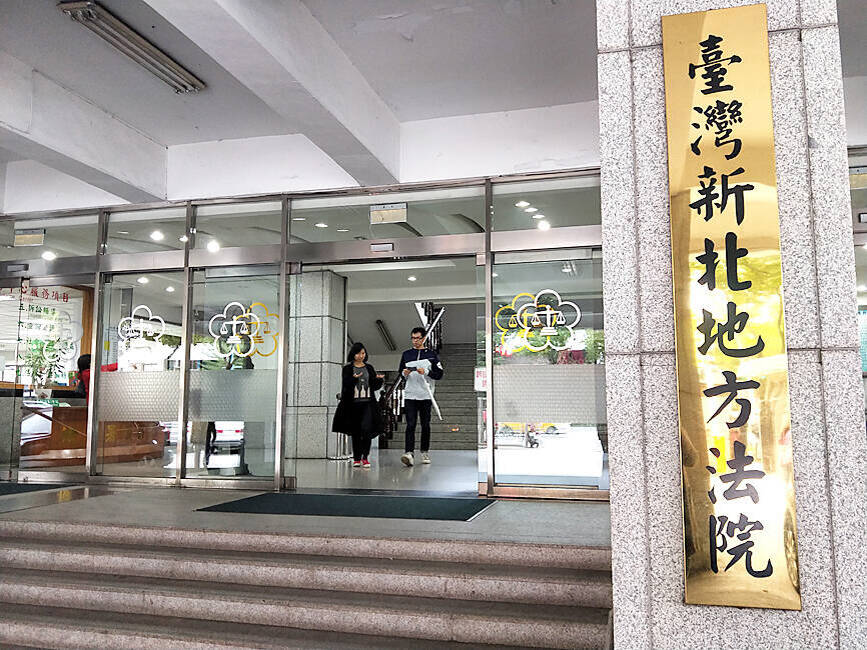A group of information technology (IT) engineers behind the operation of three Taiwan-based gambling Web sites, who had handled transactions totaling NT$4.76 billion (US$148.86 million), have been convicted by the New Taipei District Court on gambling charges.
The five IT engineers were headed by a man surnamed Chan (詹), a National Taiwan University (NTU) graduate and founder of a new high-tech company, who got fellow NTU graduates to develop apps and engage in the online gambling business, the ruling said.
All five were convicted of contravening the Criminal Code by “making profit by furnishing a place or assembling people to gamble.”

Photo: Chen Wei-tzu, Taipei Times
Chan was sentenced to six months in prison and required to pay a NT$150,000 fine.
Three were given five-month sentences, with three years probation.
Another defendant who was considered a principal figure, surnamed Huang (黃), was handed a six-month sentence and ordered to pay a fine of NT$90,000.
Huang has to serve the prison term, since he has previous criminal convictions, the ruling said.
Evidence showed that Chan set up online gambling Web sites based in Taipei and New Taipei City, supervised the Web sites’ design and operations, hired and paid for IT staff, and managed the daily gambling and casino games.
The other three IT engineers were responsible for registering the Web sites, doing regular test runs, graphic design and formatting for the Web sites, setting up an online platform and wallets for money storage and transactions for clients, investigators said.
Evidence showed that Huang held the regional operating rights for IWIN gaming and registered a company to run the payment service via a third party, enabling gamblers to store money through a virtual account.
These gambling Web sites mainly offer games where customers play and bet money, such as slot machines, baccarat, poker and other card games.
When customers win money, they can request to receive their winnings, which would be paid out to their account through a third-party payment platform, investigators said.
Judges said they handed suspended sentences to the four main figures, because they had admitted to the offenses and had no previous criminal record.
Illegal profits from Chan and Huang, worth NT$1.5 million and NT$500,000 respectively, were also seized. All five were ordered to pay fines.
The investigation found that the gambling operation had generated combined betting and money transactions of more than NT$4.76 billion since it began operations in 2021.
“All five suspects have the skills and training backgrounds to earn a regular living, but they chose to work together to run a gambling business and earn profits by enticing people to gamble... Their work promoted gambling, reaping financial gains by playing chance games, which led to more unethical behavior and deteriorating social conditions,” the judges said in their ruling.

TRAFFIC SAFETY RULES: A positive result in a drug test would result in a two-year license suspension for the driver and vehicle, and a fine of up to NT$180,000 The Ministry of Transportation and Communications is to authorize police to conduct roadside saliva tests by the end of the year to deter people from driving while under the influence of narcotics, it said yesterday. The ministry last month unveiled a draft of amended regulations governing traffic safety rules and penalties, which included provisions empowering police to conduct mandatory saliva tests on drivers. While currently rules authorize police to use oral fluid testing kits for signs of drug use, they do not establish penalties for noncompliance or operating procedures for officers to follow, the ministry said. The proposed changes to the regulations require

The Executive Yuan yesterday announced that registration for a one-time universal NT$10,000 cash handout to help people in Taiwan survive US tariffs and inflation would start on Nov. 5, with payouts available as early as Nov. 12. Who is eligible for the handout? Registered Taiwanese nationals are eligible, including those born in Taiwan before April 30 next year with a birth certificate. Non-registered nationals with residence permits, foreign permanent residents and foreign spouses of Taiwanese citizens with residence permits also qualify for the handouts. For people who meet the eligibility requirements, but passed away between yesterday and April 30 next year, surviving family members

The German city of Hamburg on Oct. 14 named a bridge “Kaohsiung-Brucke” after the Taiwanese city of Kaohsiung. The footbridge, formerly known as F566, is to the east of the Speicherstadt, the world’s largest warehouse district, and connects the Dar-es-Salaam-Platz to the Brooktorpromenade near the Port of Hamburg on the Elbe River. Timo Fischer, a Free Democratic Party member of the Hamburg-Mitte District Assembly, in May last year proposed the name change with support from members of the Social Democratic Party and the Christian Democratic Union. Kaohsiung and Hamburg in 1999 inked a sister city agreement, but despite more than a quarter-century of

China Airlines Ltd (CAL) yesterday morning joined SkyTeam’s Aviation Challenge for the fourth time, operating a demonstration flight for “net zero carbon emissions” from Taiwan Taoyuan International Airport to Bangkok. The flight used sustainable aviation fuel (SAF) at a ratio of up to 40 percent, the highest proportion CAL has achieved to date, the nation’s largest carrier said. Since April, SAF has become available to Taiwanese international carriers at Taipei International Airport (Songshan airport), Kaohsiung International Airport and Taoyuan airport. In previous challenges, CAL operated “net zero carbon emission flights” to Singapore and Japan. At a ceremony at Taoyuan airport, China Airlines chief sustainability